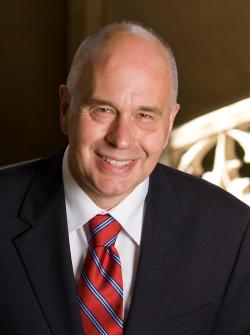Robert A. Calderbank
Class of 2015-16

Duke University
National Academy of Engineering
American Mathematical Society
During a career that spans four decades, including twenty-three years at AT&T Bell Laboratories, mathematician Robert A. Calderbank has made fundamental contributions to wireless communications, coding theory, and signal processing.
He is best known for coinventing space–time codes, a key technology behind the Wireless Revolution in communications and electronics.
His research also has aided the management of “big data,” those extremely large sets of data that—when analyzed with computers—reveal patterns, trends, and associations that relate to human behavior and interactions.
Calderbank received a bachelor’s degree from the University of Warwick (England) in 1975, a master’s degree from Oxford University in 1976, and a doctoral degree from the California Institute of Technology in 1980, all in mathematics.
He joined AT&T Bell Laboratories in 1980 and later became vice president for research at AT&T. While at Bell Labs, Calderbank earned a reputation for bringing together engineers, mathematicians, biologists, and sociologists to work effectively on interdisciplinary research. Under his leadership, the lab was one of the first industrial labs to conduct a serious study of big data, which present three major challenges: massive size, great variety, and rapid change. Big data are difficult to capture, curate, manage, and process; as a result, they can overwhelm traditional software.
After retiring from Bell Labs in 2003, Calderbank became a professor at Princeton University, where he led its Program in Applied and Computational Mathematics. He left Princeton in 2010 for Duke University, where he became dean of natural sciences. Today, Calderbank is the Charles S. Sydnor Professor of Computer Science at Duke, as well as a professor of mathematics and electrical engineering. He serves as director of Duke’s Information Initiative, an interdisciplinary program that applies computational research to unlock the potential of big data.
He is a member of the National Academy of Engineering and a fellow of the American Mathematical Society, the American Association for the Advancement of Science, and the Institute of Electrical and Electronics Engineers (IEEE).
Calderbank received the IEEE Information Theory Society Paper Award in 1995 and 1999 for his research into coding and information theory; the 2013 IEEE Richard W. Hamming Medal for his contributions to information transmission; and the 2015 Claude E. Shannon Award, the highest honor offered by the IEEE Information Theory Society.
He has written one book and published more than 500 peer-reviewed articles. He holds at least fifteen patents, his papers have garnered more than 30,000 citations, and his inventions are used in billions of consumer devices.
As a TIAS Faculty Fellow, Calderbank will collaborate on interdisciplinary research in big data with faculty and graduate students from the Department of Electrical and Computer Engineering in the Dwight Look College of Engineering, the Department of Sociology in the College of Liberal Arts, the Department of Mathematics in the College of Science, and the College of Medicine.
For more updated information:
http://ece.duke.edu/faculty/robert-calderbank
